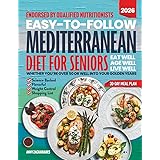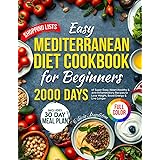Are you searching for a sustainable way to eat that not only tastes delicious but also offers remarkable health benefits? The video above with registered dietitian Lisa Valente from Healthline provides an excellent introduction to the Mediterranean diet, one of the world’s most acclaimed healthy eating patterns. But what makes this traditional approach to food so special, and how can you truly embrace its principles in your daily life? Let’s delve deeper into the Mediterranean lifestyle, exploring its profound impact on health and practical strategies for making it your own.
Understanding the Mediterranean Diet: More Than Just Food
The Mediterranean diet isn’t merely a diet in the conventional sense of restriction; instead, it’s a holistic eating pattern rooted in the traditional culinary habits of countries bordering the Mediterranean Sea. Think of nations like Greece, Italy, Spain, and France, where meals are often celebrated as social events, rich in fresh, seasonal ingredients. Research consistently highlights that people living in these regions historically exhibit lower rates of chronic diseases and tend to enjoy longer, healthier lives compared to those following a typical Western diet. This observation has driven countless studies, cementing the Mediterranean diet’s reputation as a gold standard for well-being.
However, the essence of the Mediterranean diet extends beyond just specific foods. It embodies a lifestyle that prioritizes community, mindful eating, and physical activity. Sharing meals with loved ones, slowing down to savor flavors, and enjoying an active life are all integral components that contribute to its celebrated health advantages. It’s a testament to the idea that nourishment isn’t just about nutrients, but also about the experience of eating.
The Research-Backed Benefits of Embracing a Mediterranean Eating Pattern
The scientific community has extensively validated the impressive health benefits associated with the Mediterranean diet. These advantages are not anecdotal but are supported by numerous studies demonstrating significant positive outcomes across various aspects of health:
- Heart Health: Perhaps one of the most well-known benefits, this diet is a champion for cardiovascular well-being. According to the Centers for Disease Control and Prevention (CDC), heart disease remains a leading cause of death. However, adopting a Mediterranean pattern of eating has been shown to reduce the risk of heart disease by an estimated 30% or more in some cohorts, primarily by improving cholesterol levels, reducing inflammation, and lowering blood pressure. The emphasis on healthy fats, like olive oil, and fiber-rich plant foods plays a crucial role here.
- Weight Management: While not a strict “diet” for weight loss, the Mediterranean approach naturally aids in maintaining a healthy weight. Its focus on whole, unprocessed foods, high fiber content from fruits, vegetables, and whole grains, and healthy fats promotes satiety, helping to prevent overeating. Many individuals find sustainable weight management easier without calorie counting or restrictive rules.
- Blood Sugar Regulation & Diabetes Prevention: For those concerned about blood sugar, this diet is particularly beneficial. Its rich fiber content slows down sugar absorption, preventing sharp spikes. Studies published in journals like Diabetes Care have indicated that following the Mediterranean diet can significantly reduce the risk of developing type 2 diabetes by as much as 50% in at-risk individuals.
- Cognitive Function and Brain Health: A growing body of evidence suggests that the Mediterranean diet can protect the brain. The abundance of antioxidants, healthy fats, and omega-3 fatty acids supports cognitive function, improves memory, and has been linked to a reduced risk of neurodegenerative diseases such as Alzheimer’s. A 2018 review in JAMA Network Open noted that adherence to the Mediterranean diet was associated with a slower rate of cognitive decline.
- Reduced Inflammation: Chronic inflammation is a root cause of many diseases. The anti-inflammatory properties of olive oil, fruits, vegetables, and omega-3s from fish in the Mediterranean diet help combat inflammation throughout the body.
Core Components: Foods to Enjoy and Limit
Understanding which foods to prioritize and which to moderate or limit is key to successfully adopting the Mediterranean diet. It’s about a shift in overall eating habits, not a rigid set of rules.
Embrace These Wholesome Foods
The cornerstone of the Mediterranean diet is an abundance of plant-based foods, healthy fats, and lean proteins:
- Fruits and Vegetables: Eat them generously at every meal. Think colorful berries, crisp leafy greens, juicy tomatoes, bell peppers, zucchini, and eggplant. Aim for a wide variety to ensure a broad spectrum of vitamins, minerals, and antioxidants.
- Whole Grains: Opt for unprocessed grains like whole wheat bread, oats, brown rice, quinoa, barley, and farro. These provide essential fiber, B vitamins, and sustained energy, rather than the quick sugar spike from refined grains.
- Legumes: Beans, lentils, chickpeas, and peas are excellent sources of plant-based protein and fiber. They are versatile and can be incorporated into soups, salads, stews, and side dishes.
- Nuts and Seeds: Almonds, walnuts, cashews, sunflower seeds, pumpkin seeds, and chia seeds offer healthy fats, protein, and fiber. Enjoy them in moderation as snacks or sprinkled over meals.
- Seafood: Fish and shellfish are primary protein sources, particularly fatty fish rich in omega-3s like salmon, mackerel, sardines, and tuna. Aim for at least two servings per week.
- Healthy Fats: Extra virgin olive oil is the star here, used generously for cooking, dressing, and dipping. Avocados and olives are also excellent sources of monounsaturated fats.
- Herbs and Spices: Flavor your food with nature’s bounty – basil, oregano, rosemary, thyme, garlic, and paprika. They not only add incredible taste but also boast powerful antioxidant properties, reducing the need for excessive salt.
Moderate Intake of These Delicacies
Certain foods are enjoyed in moderation, recognizing their place in a balanced diet but not as staples:
- Poultry and Eggs: Chicken and turkey, along with eggs, can be enjoyed a few times a week.
- Dairy: Cheese and yogurt are consumed in moderate portions. Greek yogurt, in particular, is a popular choice for its protein content and probiotics.
- Red Wine: This is where moderation is paramount. While often associated with the Mediterranean lifestyle, research clarifies that the wine itself isn’t a health elixir. Small glasses, enjoyed occasionally and typically with a meal in a social setting, are part of the tradition. However, if you don’t currently drink, it’s not recommended to start, as any amount of alcohol carries potential health risks.
Limit or Avoid These Ultra-Processed Items
Conversely, the Mediterranean diet actively encourages reducing or eliminating:
- Ultra-processed foods
- Added sugars
- Refined grains (white bread, pasta, sugary cereals)
- Sweetened beverages
- Excessive salt and unhealthy trans fats
Crafting a Mediterranean Day: Meal Planning Made Simple
One of the beauties of the Mediterranean diet is its flexibility. It’s not about strict meal plans or calorie counting, but rather about embracing wholesome ingredients and adapting them to your preferences. Here are some ideas for a typical day, inspired by traditional and modern adaptations:
Breakfast Inspirations
Start your day with nourishing options that fuel you:
- Greek yogurt with a handful of fresh strawberries and a sprinkle of chia seeds.
- Oatmeal cooked with water or unsweetened almond milk, topped with blueberries and a drizzle of honey.
- Scrambled eggs with sautéed spinach and cherry tomatoes, served with a slice of whole wheat toast and a splash of olive oil.
Lunch Delights
Light yet satisfying meals are perfect for midday energy:
- A vibrant quinoa salad tossed with cucumbers, bell peppers, chickpeas, kalamata olives, and a lemon-herb vinaigrette.
- Tuna salad (made with olive oil instead of mayo) served over a bed of mixed greens with chopped celery and red onion.
- A whole-grain sandwich filled with hummus, sliced cheese, roasted vegetables like zucchini and eggplant, and fresh basil.
Dinner Innovations
Evenings can feature heartier, flavorful dishes that bring people together:
- Grilled salmon or baked cod served alongside roasted asparagus and sweet potatoes.
- Chicken breast marinated in herbs and olive oil, grilled, and paired with a large Greek salad.
- Lentil soup with crusty whole-grain bread, rich with vegetables and aromatic spices.
- A healthy take on lasagna, using whole wheat pasta, plenty of vegetables (like spinach and mushrooms), and a lean meat sauce or rich lentil sauce.
Smart Snacking
When hunger strikes between meals, reach for healthy options:
- A handful of almonds or walnuts.
- Fresh fruit like an apple, orange, or pear.
- A small bowl of olives.
- Hummus with sliced bell peppers, carrots, or whole-wheat pita bread.
The true genius of the Mediterranean diet lies in its adaptability. The principles can easily be applied to a diverse range of cuisines. Imagine a vibrant ramen noodle bowl brimming with fresh vegetables, succulent shrimp, and a flavorful broth. Or perhaps tacos filled with black beans, sautéed peppers, and creamy avocado, topped with a fresh salsa. Even a rich lentil curry served over brown rice aligns perfectly with the emphasis on plant-based ingredients, whole grains, and aromatic spices. It’s about taking the core values of fresh, whole foods and making them fit your cultural background and taste preferences, ensuring that healthy eating is always an enjoyable journey.
Navigating the Nuances: Alcohol, Flexibility, and Considerations
The Mediterranean diet stands out for its emphasis on moderation and common-sense principles, rather than strict counting or elimination. This flexibility is a major advantage for many, making it a sustainable lifestyle rather than a temporary fix.
Alcohol and the Mediterranean Diet
As Lisa Valente highlighted, wine is often pictured when thinking of the Mediterranean diet. However, it’s crucial to understand its role. While moderate red wine consumption is a *part* of the traditional Mediterranean lifestyle, it’s not considered a health boon in itself. Rather, it’s the context—small amounts, enjoyed socially with meals, and often alongside a diet rich in other healthful foods—that is significant. Medical science generally advises that if you don’t drink alcohol, you shouldn’t start for health benefits, as alcohol consumption is associated with various health risks. The overall Mediterranean eating pattern is notable for its generally low intake of other alcoholic beverages like beer and spirits.
The Freedom of Flexibility vs. Rigid Structures
For individuals who thrive on precise guidelines, the Mediterranean diet’s lack of a rigid structure can initially feel daunting. There are no calorie targets, specific macro breakdowns, or forbidden food groups (aside from highly processed items). However, many find this very flexibility to be its greatest strength, making it easier to adhere to long-term. It encourages intuitive eating and a deeper connection to food choices. Rather than viewing it as a “diet,” consider it a journey towards a more balanced and joyful relationship with food.
Is the Mediterranean Diet for Everyone?
This eating pattern is generally considered safe and beneficial for most people. Its focus on nutrient-dense, whole foods naturally reduces the intake of common culprits for health issues like excessive added sugars and unhealthy fats. However, if you are managing a chronic condition, or have specific dietary restrictions or allergies, it is always wise to consult with your healthcare provider or a registered dietitian. They can offer personalized guidance to adapt the Mediterranean diet’s principles to your unique health needs, ensuring it is both safe and effective for you.
While the traditional Mediterranean diet’s origins and much of its research have focused on European cuisines, its core principles of abundant fruits, vegetables, whole grains, legumes, and healthy fats are universally applicable. Most cultures worldwide incorporate these healthful components into their culinary traditions. Therefore, it’s about embracing the underlying philosophy and adapting it with foods and flavors that resonate with you and your cultural background. The Mediterranean diet, at its heart, is a celebration of real food, shared experiences, and vibrant health, offering a truly delicious path to wellness for all.











